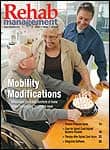Are you ready for what’s coming?

When a therapist at mid-career asks, “Is this all there is?” an online program can open a door to a place where an answer to that question may be found. Career veterans may want to reinvent themselves after a time, or retool how they use their experience. The idea of teaching physical therapy may appeal to some veteran therapists, while for others the possibilities opened by direct access laws may have them warming to the idea of opening their own clinics. Either endeavor can be supported by strengthening your academic credentials, perhaps by picking up an advanced physical therapy degree through an online program.
I am not evangelizing establishing the doctor of physical therapy (DPT) as the entry level degree for the profession. What I am encouraging, however, is that veteran practitioners, who lack time and access to a traditional degree program but want to rekindle the animal desire they once felt for physical medicine, get hip to online education.
Online degree programs are agile, which means they keep pace with the evolution of healing sciences and bring students face-to-face with what’s best in practice right now. There is little advantage to practicing under yesterday’s thinking. Remember when Fen Phen was good and red wine was bad? What about the difference in what we now understand about the window for stroke rehab compared to what therapists learned when they graduated 20 years or 30 years ago? Physical therapy practice is now advancing into areas that include cancer rehabilitation, wound care, and efforts to minimize developmental delays among premature infants. Opportunity awaits those who are prepared.
Advancing a degree forces clinicians to stand and face the oncoming engine of evidence-based practice, and after the collision anyone left standing walks away with transformational clinical acumen and leadership skills. And, though a master’s or doctorate may not make you live longer, it may quite possibly make you live better.
Online programs make particular sense when time and distance obstruct opportunity. Even among PTs and OTs who live within commuting distance of a facility that offers an advanced degree program, many bow to schedules that restrict them from attending regular classes. These problems evaporate through online programs, which let students work remotely and on their own schedules.
There are caveats associated with online degrees. Bogus institutions, for example, are a potential peril in the virtual world. Students who want the safest bets should seek brand name schools that offer online degree programs. Few things rival the security of having your DSL connect to a brick and mortar facility that also has a football stadium and student union at the other end. School credentials are important, too, since a license from a state department of education does not ensure a school is accredited as a quality institution. In the United States an institution’s quality and legitimacy are underwritten by six regional accrediting agencies and more than 80 national accrediting agencies recognized by the Council for Higher Education Accreditation. A list of nationally recognized accrediting agencies can be found by logging onto the US Department of Education’s web site (www.ed.gov) and entering “accrediting” into the search field.
Your career is what you make it. If you continue to do everything exactly as you have, one year from now you won’t be any better at what you do—you’ll just be older.
—Frank Long
()
From the Editor:
Rehab Management is looking for industry professionals who are interested in writing for the magazine. For more information, please contact the editor at .




